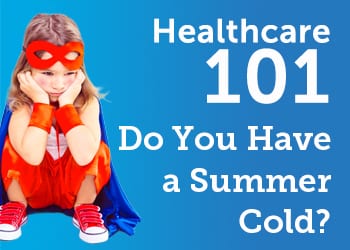Healthcare 101: Do You Have a Summer Cold?
July 15, 2015

Nothing puts a damper on summer fun and relaxation like an untimely summer cold. With beach trips and barbecues aplenty, and no widespread illness going around, it can feel particularly unjust. Colds are viral upper respiratory infections and can occur anytime of year — even if they’re most prevalent during winter months. However, a case of the coughs or sniffles might merely mean your allergies are acting up, and you don’t have a cold at all. Here are a few facts to help you decipher the difference.
Similarities
Summer colds and seasonal allergies certainly share similar symptoms. Both can result in nasal drip, sneezing, congestion, an itchy or sore throat, headaches, and fatigue.
Key Differences
- Fever and body aches indicate you are more likely suffering from a cold than allergies.
- Though increased drainage may occur with both colds and allergies, cloudy, discolored mucus points to a cold.
- Allergies are much more likely to cause itchy, watery eyes and an itchy nose. Also look for dark circles under the eyes.
- Colds often run their course between 3 and 14 days. Allergy symptoms can persist for months, depending on the specific allergies the individual has, and how long they are exposed to the allergens.
- If the same symptoms occur at the same time every year, it’s most likely allergies. Grasses and weeds are the biggest outdoor allergy culprits in the summertime. Dust mites are also particularly bad in the summer, hiding out in beds, fabric and carpets.
- If you develop symptoms after being around another person with a cold, it’s likely that you’ve contracted the virus.
If you keep your year-round allergies under control with daily medication but start feeling symptoms in spite of that, check the pollen count in your area to see if there’s been a sudden increase. If there hasn’t been, you might be getting a cold.
Summer Cold Precautions and Treatments
- Don’t let your guard down just because it’s summer. Wash your hands regularly, and avoid sharing drinks and utensils with others. Also, remember to cover your mouth when you cough and sneeze (generally good life advice, any time of year)!
- Get plenty of rest and drink lots of water.
- Boost your immune system with fruits and vegetables. Good thing so many fantastic fruits are in season!
To treat a cold, you can use over-the-counter decongestants to loosen passageways for some relief while your body fights the virus. Over-the-counter pain relievers can help manage your fever. Antibiotics won’t fight a cold- however, sometimes colds and allergies can lead to more complex upper respiratory issues such as sinus infections or bronchitis. Consider visiting CareSpot or a primary care physician if you think you have cold or allergy symptoms developing into something worse.
When to Seek Professional Care:
If your cold persists over 14 days, by all means seek care from a medical professional.
Pneumonia starts with flu-like symptoms and a fever. If a second, more acute fever develops after the first onset of symptoms, seek medical attention.
Pertussis, or “whooping cough,” also begins with cold systems. Watch for particularly bad coughing spasms and the tell-tale whooping sound. Also, check to be sure that you and your child are up to date on your pertussis vaccinations.
If congestion and headaches persist and you feel painful sinus pressure, you could have a sinus infection, which can result from a cold or allergies.
If it is difficult to swallow due to your sore throat, it’s important to get that checked out to ensure there’s not an infection.
If your cold symptoms are accompanied by vomiting and difficulty keeping liquids down, seek medical attention.
